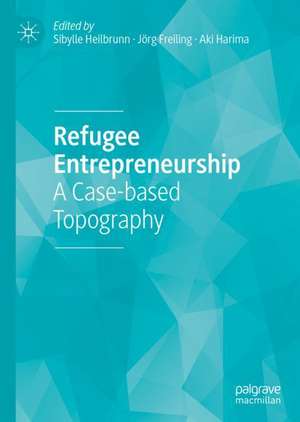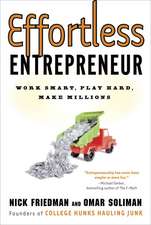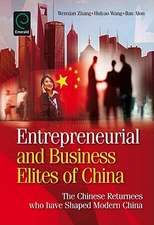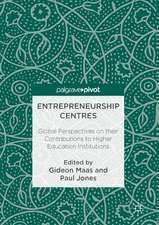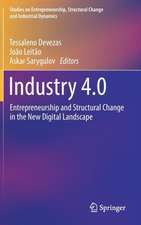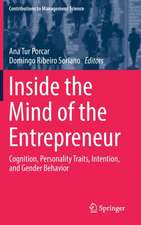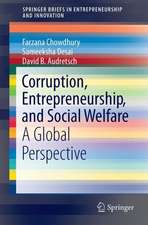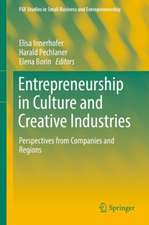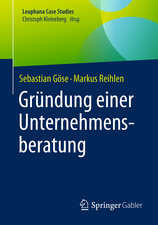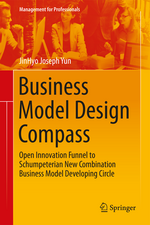Refugee Entrepreneurship: A Case-based Topography
Editat de Sibylle Heilbrunn, Jörg Freiling, Aki Harimaen Limba Engleză Hardback – 2 oct 2018
| Toate formatele și edițiile | Preț | Express |
|---|---|---|
| Paperback (1) | 695.19 lei 6-8 săpt. | |
| Springer International Publishing – 8 ian 2019 | 695.19 lei 6-8 săpt. | |
| Hardback (1) | 700.61 lei 6-8 săpt. | |
| Springer International Publishing – 2 oct 2018 | 700.61 lei 6-8 săpt. |
Preț: 700.61 lei
Preț vechi: 824.25 lei
-15% Nou
Puncte Express: 1051
Preț estimativ în valută:
134.08€ • 139.46$ • 110.69£
134.08€ • 139.46$ • 110.69£
Carte tipărită la comandă
Livrare economică 14-28 aprilie
Preluare comenzi: 021 569.72.76
Specificații
ISBN-13: 9783319925332
ISBN-10: 3319925334
Pagini: 282
Ilustrații: XXVII, 282 p. 8 illus.
Dimensiuni: 148 x 210 x 27 mm
Greutate: 0.52 kg
Ediția:1st ed. 2019
Editura: Springer International Publishing
Colecția Palgrave Macmillan
Locul publicării:Cham, Switzerland
ISBN-10: 3319925334
Pagini: 282
Ilustrații: XXVII, 282 p. 8 illus.
Dimensiuni: 148 x 210 x 27 mm
Greutate: 0.52 kg
Ediția:1st ed. 2019
Editura: Springer International Publishing
Colecția Palgrave Macmillan
Locul publicării:Cham, Switzerland
Cuprins
1. Introduction; Sibylle Heilbrunn and Rosa Lisa Iannone.- 2. Umayyad: A Syrian Refugee Business in Bremen, Germany; Aki Harima, Manal Haimour and Jörg Freiling.- 3. The Story of the Syrian-German Cheese Manufacturer, Cham Saar; Carina Hartmann and Katharina Schilling.- 4. "Our Table": Between Activism and Business in Dublin, Ireland; Joachim Kolb.- 5. The Story of an Adolescent Afghan Refugee who became an Entrepreneur in France; Crista Plak and Vincent Lagarde.- 6. "FlüchtlingMagazin" (Refugee Magazine): A Syrian Social Business in Hamburg, Germany; Julia Freudenberg.- 7. The Story of Jonny, an Eritrean Entrepreneur in Tel Aviv, Israel; Sibylle Heilbrunn and Anna Rosenfield.- 8. A Case Study of an Ethiopan Refugee in Germany; Bamrot Yekoye Abebe and Petra Moog.- 9. The Blessing African Boutique and City Market Food: A Congolese Refugee Business in Darwin, Australia; Jane Ruparanganda, Edouard Ndjamba Ndjoku and Ram Vemuri.- 10. Refuge to Centre Stage: The Story of Arash; Rosa Lisa Iannone.- 11. From Hell to…an Entrepreneurial Life: An Iranian Refugee in France; Adnane Maalaoui, Myriam Razgallah, Salomé Picard and Séverine Leloarne-Lemaire.- 12. From Refugee to Trader: In the Footsteps of Marco Polo; Dilek Zamantılı Nayır.- 13. Internally Displaced Entrepreneurs in Pakistan: The Case of Abdullah; Humera Manzoor, Mehboob Ur Rashid, Cherry W. M. Cheung and Caleb Kwong.- 14. Refugee Entrepreneurship: A Case Study from the Sultanate of Oman; Ramo Palalić, Léo-Paul Dana and Veland Ramadani.- 15. Entrepreneurship in Extreme Environments: Businesses in the Dadaab Refugee Camp in Kenya; Marlen de la Chaux.- 16. From Cameroon to South Africa: Refugee to Successful Businessman; Robertson Tengeh.- 17. The Resilience of a Syrian Woman and her Family through Refugee Entrepreneurship in Jordan; Sophie Alkhaled.- 18. Refugee Entrepreneurship: Learnings from Case Evidence; Jörg Freiling and Aki Harima.
Notă biografică
Sibylle Heilbrunn is Professor of Organisational Sociology and the Dean of the Faculty of Social Sciences and Humanities at Kinneret College on the Sea of Galilee, Israel. She was visiting professor at the University of Bremen, Germany, and currently holds a research fellowship at the Institute for Research of the Kibbutz at Haifa University. Additionally, she is an editorial board member of international journals in the field of management and entrepreneurship.
Jörg Freiling is Full Professor and Head of the Chair in Small Business & Entrepreneurship (LEMEX) at the University of Bremen, Germany. Jörg is Vice Dean of the Faculty of Business Studies and Economics at the University of Bremen. He is also co-organiser of the International Conferences on MDE and other entrepreneurship conferences in Europe. Additionally, he is an editor and editorial board member of many international journals.
Aki Harima is a Postdoctoral Researcher at the Chair of Small Business & Entrepreneurship (LEMEX) at the University of Bremen, Germany. She has been a visiting scholar at a number of international universities. Aki co-organises the International Conferences on Migration and Diaspora Entrepreneurship, and her research interests revolve around the transnational entrepreneurial activities of migrants, diasporas and refugees, start-up ecosystems, and support for vulnerable entrepreneurs.
Jörg Freiling is Full Professor and Head of the Chair in Small Business & Entrepreneurship (LEMEX) at the University of Bremen, Germany. Jörg is Vice Dean of the Faculty of Business Studies and Economics at the University of Bremen. He is also co-organiser of the International Conferences on MDE and other entrepreneurship conferences in Europe. Additionally, he is an editor and editorial board member of many international journals.
Aki Harima is a Postdoctoral Researcher at the Chair of Small Business & Entrepreneurship (LEMEX) at the University of Bremen, Germany. She has been a visiting scholar at a number of international universities. Aki co-organises the International Conferences on Migration and Diaspora Entrepreneurship, and her research interests revolve around the transnational entrepreneurial activities of migrants, diasporas and refugees, start-up ecosystems, and support for vulnerable entrepreneurs.
Textul de pe ultima copertă
Through a global series of case studies, this pioneering book delves into refugee entrepreneurship - a major economic, political and social issue emerging as a top priority. Stories from Australia, Germany, Pakistan and many other countries, highlight the obstacles facing refugees as they try to integrate and set up businesses in their new countries. Engaging contributions set the stage for a cross-analysis of the particularities and limitations faced by refugee entrepreneurs, culminating in an extended discussion about the future implications of refugee entrepreneurship for theory, policy and practice. This interdisciplinary book explores the motivations and drivers of refugee entrepreneurship, making it an insightful read not only for those engaged in entrepreneurship, but also for those interested in migration studies from a variety of academic disciplines.
Caracteristici
Includes case studies of refugee entrepreneurs originating from countries such as Syria, Iran and Afghanistan Helps the reader understand the experience of refugee entrepreneurs, adding another dimension to the debate around refugee policy Compares the similarities and differences between refugee entrepreneurship in different contexts
